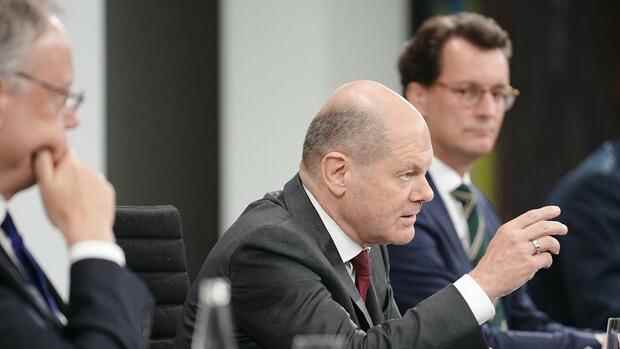Federal Chancellor Olaf Scholz (2nd from left, SPD), Stephan Weil (l, SPD), Prime Minister of Lower Saxony, and Hendrik Wüst (2nd from right, CDU), Prime Minister of North Rhine-Westphalia, give a press conference after the Prime Ministers’ Conference.
(Photo: dpa)
Berlin The federal and state governments have agreed on how they want to relieve consumers and companies in the face of high energy prices and inflation. “We’ll join hands and we’ll solve our country’s problems together,” said Chancellor Olaf Scholz (SPD) after a meeting with the prime ministers on Wednesday evening.
In the past two weeks, all parties had negotiated intensively and also used the past weekend and the two public holidays at the beginning of the week to clarify how they want to finance the planned relief. The federal and state governments then quickly agreed on Wednesday evening. “Today was a good meeting,” said the chairman of the Prime Ministers’ Conference, the Prime Minister of Lower Saxony, Stephan Weil (SPD).
The chancellor and the prime ministers agreed that the federal states would co-finance some of the relief measures, but in return would also receive more money from the federal government for local transport and the accommodation of refugees. They also want to share the costs of the planned housing benefit reform.
The federal and state governments are still struggling to help oil customers
At the beginning of September, the traffic light coalition had caused plenty of conflict when it presented a 65 billion euro relief package, of which the federal states were supposed to shoulder almost half without being asked. The federal states then asked for relief elsewhere.
Top jobs of the day
Find the best jobs now and
be notified by email.
This should now exist. This includes help for medium-sized companies as well as for hospitals and care facilities. The federal government is now ready to provide up to twelve billion euros from the “Economic Stabilization Fund”, eight billion of which for hospitals and care facilities alone.
The federal and state governments have not yet reached an agreement on hardship regulations for small and medium-sized companies, which suffer particularly badly from high energy costs. “We agree that there must be a hardship regulation,” said the vice-chairman of the conference, the North Rhine-Westphalian Prime Minister Hendrik Wüst (CDU). However, there is still no agreement as to who will bear the costs.
In principle, the federal government is responding to the demands of the federal states as part of its 200 billion euro aid package for energy price brakes. They had complained about a “winter gap”, since the planned gas price brake should only apply from March 2023 – and thus only after the most heating-intensive months. Now the decision says: “Retroactivity to February 1, 2023 is sought.” In December, the federal government will take over the down payments of all gas and district heating customers. The only open question is what the aid for January should look like. Wüst and Weil appealed to the federal government that there should be no gap.
>> Also read here: Relief in the energy crisis threatens a price-stimulus spiral
The countries had also called for relief for households and companies that use oil. Wüst spoke of a “justice gap”. Here, the federal government is now offering a regulation within the framework of a hardship fund. The union-governed federal states called for a reduction in sales tax.
The federal states are basically satisfied with the sum from the hardship fund; according to the Prime Ministers of Lower Saxony and North Rhine-Westphalia, they could have imagined more in terms of refugee costs. The countries are expecting almost 16 billion euros for this year and next, as more refugees than in the crisis year 2015 have already arrived – and not only from Ukraine.
The federal government provided two billion euros in the spring and now wants to contribute a further 1.5 billion euros. In 2023 it should be 2.75 billion euros. The federal and state governments want to talk at least “about further developments” in Easter 2023. The federal government has recognized that it has to contribute to the refugee costs on a permanent basis, the state side said with satisfaction.
The 49-euro ticket comes as a “Deutschlandticket”
The federal camps also agree on the question of launching a successor model for the summer discount ticket in local transport. There should be a “digital Deutschlandticket valid throughout Germany” from 2023. Since the new discount campaign for a 49-euro ticket will tear deep holes in the coffers of the transport companies, the federal government is transferring 1.5 billion euros to the federal states, which are to inject an amount of the same amount again. “It’s an introductory price. The price will rise,” said Wüst.
What is more important to the states, however, is that the federal government, after much hesitation, is also prepared to provide one billion euros more a year for local transport. The regionalization funds with which the federal states order bus and train lines will be around eleven billion euros in the future.
They should also increase by three percent annually instead of the previous 1.8 percent, thus cushioning inflation. The federal states, however, had demanded at least 1.5 billion euros extra and this already in 2022. They fear that the transport companies would otherwise have to discontinue transport offers.
>> Also read here: What is known so far about the 49-euro ticket
The federal government has shown no accommodation at all with the planned housing benefit reform. With it, the federal government wants to increase the rent subsidy for the needy and expand the circle of beneficiaries from 640,000 households to two million. The federal states are to bear half of the costs of four billion euros, which they have so far rejected. The union prevailed. The federal and state governments should continue to share the costs in the future.
More: How relief from the gas price brake should be taxed
